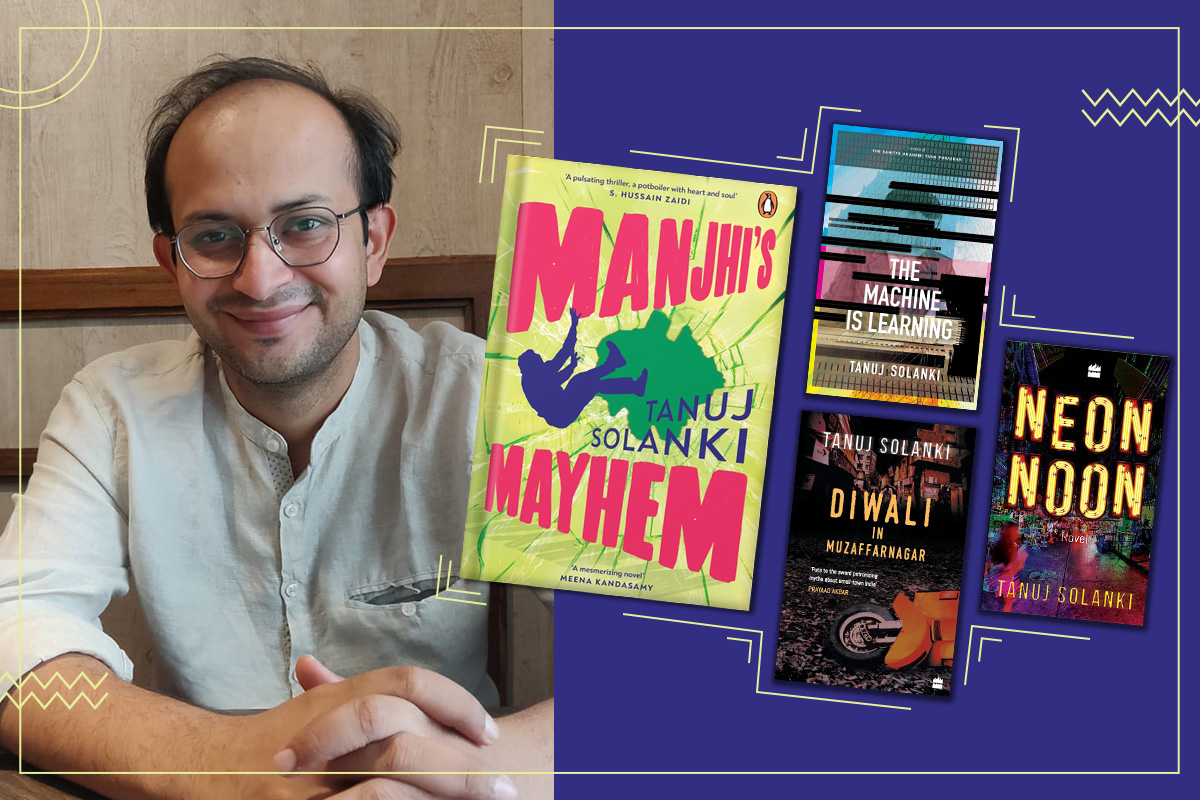
Sahitya Akademi Yuva Puraskar winner Tanuj Solanki answers all our questions about his latest novel, Manjhi’s Mayhem: from his genre shift to doing justice to a Dalit POV and his crime-writing inspirations. By Sumeet Keswani
Kunzum was delighted to host a book talk on Manjhi’s Mayhem, Tanuj Solanki’s latest novel, at its Jorbagh store recently. The conversation that took place between the award-winning author and book editor Shreya Punj not only deconstructed the exciting new crime thriller, but also touched upon Solanki’s other three books: Neon Noon (shortlisted for the Tata Literature Live! First Book Award), Diwali in Muzaffarnagar (which won him the Sahitya Akademi Yuva Puraskar), and The Machine is Learning (longlisted for the JCB Prize for Literature 2020). Naturally, we—and the audience—wanted to know more! So we reached out to Solanki for a detailed interview.
A Conversation with Tanuj Solanki
Kunzum: After Neon Noon, Diwali in Muzaffarnagar, and The Machine is Learning, what made you write a crime thriller?
Tanuj Solanki: The three books you mention all have people who’ve migrated to big cities from smaller places. Manjhi’s Mayhem is arguably an extension of that line of work. But I understand that argument is not totally convincing because of the overt genre shift. Well, I’ve written a crime novel because I wanted to read a specific kind of crime novel in India and was not able to find it.
Kunzum: All your previous novels featured some facet of you or your life. Neon Noon, you once said, was partly your story; Diwali in Muzaffarnagar echoed the small town you grew up in; and The Machine is Learning‘s protagonist worked at a life-insurance company. Which aspect of Manjhi’s Mayhem comes from your personal life/experiences?
Tanuj Solanki: None. Even in my earlier books, including Neon Noon, an overwhelming majority of situations, scenes, characters, and milieus are outside my life experience. A fiction writer may take from reality, sure, but their loyalty is to the innate logic and objective of the story they’re telling. Real life has no innate logic or objective.
Kunzum: Which crime thrillers have you enjoyed reading?
Tanuj Solanki: I have recently enjoyed Margaret Millar’s novels a lot. James Sallis’ Drive is an all-time favourite. As is George V. Higgins’ The Friends of Eddie Coyle. I love Nordic crime fiction too. Johan Theorin and Arnaldur Indridason are my favourite writers.
Kunzum: As an upper-caste man writing the story of a Dalit security guard, did you have any hesitations? How did you go about the research to get his perspective right?
Tanuj Solanki: Fiction writers must be able to write across gender — this sentiment has wide acceptance. But as a formula, it is saying something more fundamental, which is that a fiction writer has to be able to go beyond their identity and still create believable ‘realities.’ I didn’t have any hesitation about writing a Dalit character. All my doubts and strife were about making this character’s reality (and his voice, because he’s the one narrating) credible. And something like this can also be done very well — James Sallis is white, e.g., and his detective Lew Griffin is black, and there are absolutely no problems in that because of how Sallis writes Griffin.
Kunzum: Which writers have most influenced your craft?
Tanuj Solanki: Too many to name. There was too much of a Roberto Bolano explosion happening when I started writing fiction, so it was impossible to not be influenced by him. Right now I’m quite obsessed with Jon McGregor, in the way that I want to write as well as him but I’m still trying to figure out what makes him so good.
Kunzum: What are you working on next? Is there another Manjhi novel on the cards?
Tanuj Solanki: I’m working on a Manjhi novel, yes. And there is a novella titled Commencement.
Kunzum: If you were to recommend five books to our readers, which would they be?
Tanuj Solanki: Blood Meridian by Cormac McCarthy, Reservoir 13 by Jon McGregor, Requiem in Raga Janki by Neelum Saran Gour, Mai by Geetanjali Shree (Hindi), and Joothan by Om Prakash Valmiki (Hindi).
Related: In Search of the Divine: Rana Safvi on her Sparkling Foray into Sufi History

1 thought on ““I’ve written a crime novel because I wanted to read a specific kind in India and wasn’t able to find it”: Tanuj Solanki on his new book”